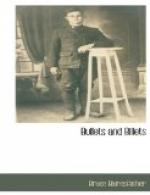[Illustration: “ullo! ’Arry”]
When you made a dug-out in those days you made it out of anything you could find, and generally had to make it yourself. That first night I was “in” I discovered, after a humid hour or so, that our battalion wouldn’t fit into the spaces left by the last one, and as regards dug-outs, the truth of that mathematical axiom, “Two’s into one, won’t go,” suddenly dawned on me with painful clearness. I was faced with making a dug-out, and it was raining, of course. (Note.—Whenever I don’t state the climatic conditions, read “raining.”) After sloshing about in several primitive trenches in the vicinity of the spot where we had fixed our best machine-gun position, my sergeant and I discovered a sort of covered passage in a ditch in front of a communication trench. It was a sort of emergency exit back from a row of ramshackle, water-logged hovels in the ditch to the communication trench. We decided to make use of this passage, and arranged things in such a way that by scooping out the clay walls we made two caves, one behind the other. The front one was about five yards from the machine gun, and you reached the back cave by going through the outer one. It now being about 11 p.m., and having been for the last five hours perpetually on the scramble, through trenches of all sorts, I drew myself into the inner cave to go to sleep.
This little place was about 4 feet long, 3 feet high, and 3 feet wide. I got out my knife, took a scoop out of the clay wall, and fishing out a candle-end from my pocket, stuck it in the niche, lit it and a cigarette. I now lay down and tried to size up the situation and life in general.
Here I was, in this horrible clay cavity, somewhere in Belgium, miles and miles from home. Cold, wet through and covered with mud. This was the first day; and, so far as I could see, the future contained nothing but repetitions of the same thing, or worse.
[Illustration: rucksacks]
Nothing was to be heard except the occasional crack of the sniper’s shot, the dripping of the rain, and the low murmur of voices from the outer cave.
In the narrow space beside me lay my equipment; revolver, and a sodden packet of cigarettes. Everything damp, cold and dark; candle-end guttering. I think suddenly of something like the Empire or the Alhambra, or anything else that’s reminiscent of brightness and life, and then—swish, bang—back to the reality that the damp clay wall is only eighteen inches in front of me; that here I am—that the Boche is just on the other side of the field; and that there doesn’t seem the slightest chance of leaving except in an ambulance.
My machine-gun section for the gun near by lay in the front cave, a couple of feet from me; their spasmodic talking gradually died away as, one by one, they dropped off to sleep. One more indignant, hopeless glare at the flickering candle-end, then I pinched the wick, curled up, and went to sleep.




